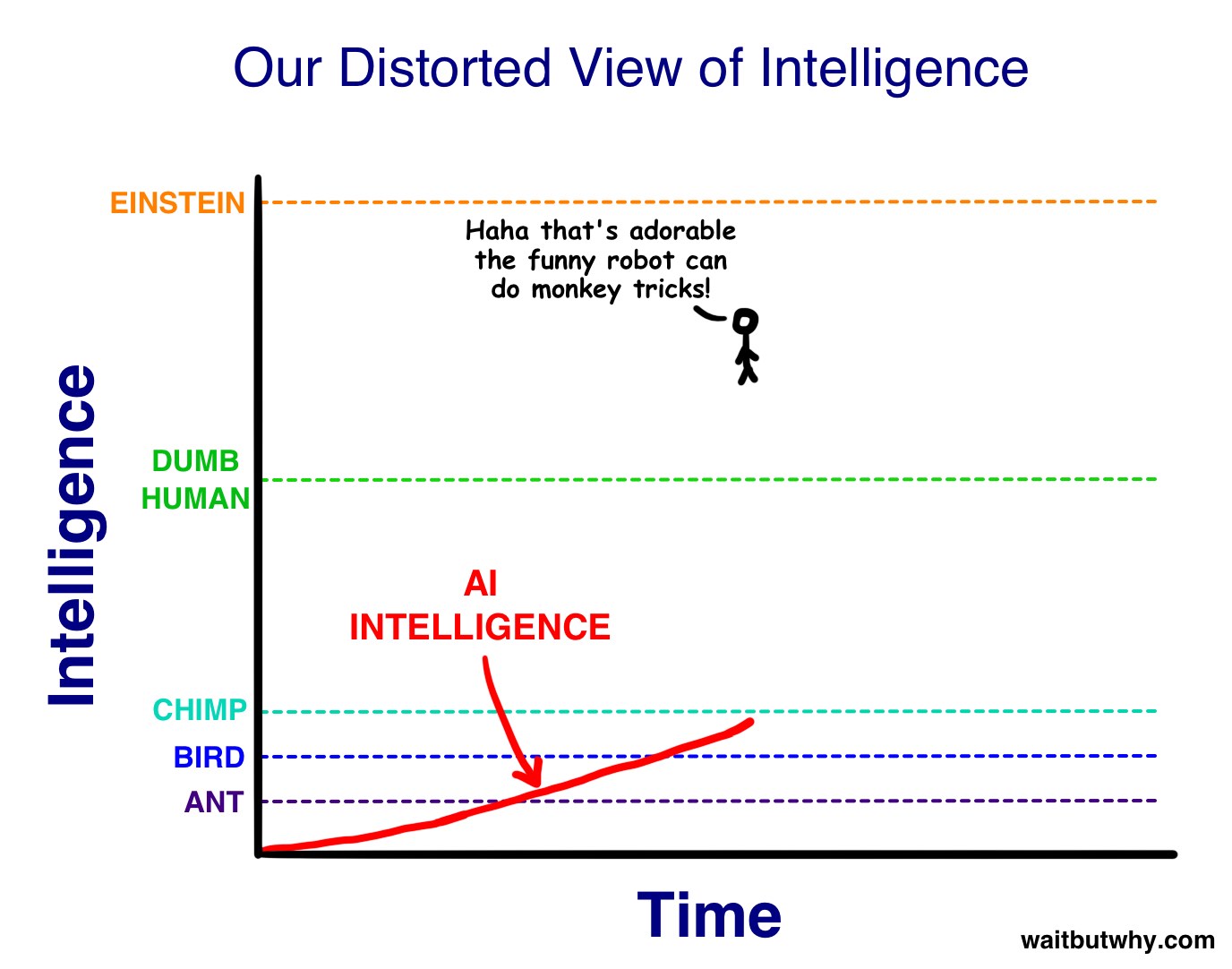The Reality Of AI: Far From Human-Level Thinking

Table of Contents
The Limitations of Current AI Architectures
Current AI relies heavily on narrow or weak AI, designed for specific tasks. This contrasts sharply with the broad, adaptable intelligence of humans. These systems excel within their defined parameters but often fail spectacularly when confronted with anything outside their training data. This fundamental limitation stems from several key factors:
-
Focus on data: AI excels at pattern recognition within its training data. Machine learning algorithms identify statistical correlations and make predictions based on these patterns. However, this doesn't equate to genuine understanding or comprehension. The AI merely manipulates data; it doesn't grasp the underlying meaning or context. Think of it like a parrot repeating words—it can mimic human language, but it doesn't understand the meaning behind them.
-
Lack of generalizability: A crucial difference between human and artificial intelligence is generalizability. Humans can easily transfer knowledge and skills learned in one context to another. AI, however, struggles with this. An AI trained to identify cats in images may fail completely when presented with a cat in a different pose or lighting condition. This lack of adaptability highlights the significant gap in cognitive flexibility.
-
Inability to reason abstractly: Humans effortlessly engage in abstract reasoning, understanding concepts, metaphors, and complex relationships. Current AI systems, however, lack this capacity for nuanced, contextual reasoning. They operate based on pre-programmed rules and statistical probabilities, failing to grasp the subtleties of human thought.
-
Examples: Image recognition systems might flawlessly identify cats in typical images but fail with unusual angles or obscured features. Chatbots, while improving rapidly, frequently struggle with complex conversations or open-ended questions that require genuine understanding of context and nuance. They often provide nonsensical or irrelevant responses, demonstrating their limitations in handling ambiguity.
The Absence of Consciousness and Self-Awareness
Beyond the technical limitations, a fundamental difference between human and artificial intelligence lies in consciousness and self-awareness. Current AI systems lack subjective experience, feelings, and the understanding of themselves as individual entities. These are fundamental aspects of human consciousness that remain entirely absent from even the most advanced AI systems.
-
AI operates based on algorithms and data: It doesn't possess qualia—the subjective, qualitative character of experience. While an AI might process visual information and identify objects, it doesn't "see" in the same way a human does. It lacks the subjective experience of visual perception.
-
No self-model: Humans possess a rich self-model—an understanding of themselves as individuals with unique experiences, thoughts, and feelings. AI lacks this crucial element. It operates without any internal representation of itself as an independent agent.
-
Distinction between simulation and genuine understanding: AI can convincingly mimic human behavior, generating human-like text or playing games at a superhuman level. However, this doesn't indicate genuine understanding or consciousness. It’s a sophisticated simulation, not a reflection of inner life.
-
Examples: An AI can convincingly generate a poem or a news article, but this doesn't imply that it understands the emotions, intentions, or meanings expressed in the text. Similarly, an AI can play chess masterfully, but it doesn't feel the joy of victory or the frustration of defeat.
The Ethical and Societal Implications of Overestimating AI
Overhyping AI capabilities poses significant ethical and societal risks. Relying on AI for complex decisions without a clear understanding of its limitations can lead to unforeseen and potentially harmful consequences.
-
Bias in AI algorithms: AI algorithms are trained on data, and if that data reflects existing societal biases (e.g., racial, gender, socioeconomic), the AI will inherit and potentially amplify those biases. This can lead to unfair or discriminatory outcomes in areas like loan applications, hiring processes, and even criminal justice.
-
Job displacement anxieties: The fear of widespread job displacement due to AI automation is often fueled by misunderstandings of its capabilities. While AI will undoubtedly automate certain tasks, its current limitations suggest that complete job replacement is less imminent than often portrayed. A more nuanced perspective on AI's role in the workforce is needed.
-
Unintended consequences: Deploying AI systems without thorough testing and evaluation can lead to unexpected and undesirable outcomes. Complex systems can behave in unpredictable ways, especially when interacting with the real world.
-
Examples: Biased facial recognition software has been shown to misidentify individuals from certain ethnic groups, leading to potentially harmful consequences. Algorithms used in social media can exacerbate existing social inequalities by reinforcing filter bubbles and echo chambers.
Conclusion
In summary, while artificial intelligence has achieved remarkable feats in narrow domains, the reality is that true human-level thinking remains a distant goal. Current AI systems lack the consciousness, abstract reasoning, and generalizability of human intelligence. Understanding these limitations is crucial to avoiding the pitfalls of overhyping AI and responsibly developing this transformative technology. We must approach the development and deployment of artificial intelligence with a realistic understanding of its current capabilities and potential, recognizing that it is far from achieving human-level thinking. Focusing on ethical considerations and responsible innovation in artificial intelligence is crucial for harnessing its benefits while mitigating potential risks. Let's foster a balanced perspective on the true potential of artificial intelligence.

Featured Posts
-
 Trumps Potential Pardon Of Pete Rose A Look At The Mlb Betting Ban
Apr 29, 2025
Trumps Potential Pardon Of Pete Rose A Look At The Mlb Betting Ban
Apr 29, 2025 -
 Eligibility Of Convicted Cardinal To Participate In Papal Conclave
Apr 29, 2025
Eligibility Of Convicted Cardinal To Participate In Papal Conclave
Apr 29, 2025 -
 The Zuckerberg Trump Dynamic Implications For The Tech Industry
Apr 29, 2025
The Zuckerberg Trump Dynamic Implications For The Tech Industry
Apr 29, 2025 -
 Chicago Office Market Crisis The Rise Of Zombie Buildings
Apr 29, 2025
Chicago Office Market Crisis The Rise Of Zombie Buildings
Apr 29, 2025 -
 Green Bay Packers Eyeing Two International Matches In 2025 Season
Apr 29, 2025
Green Bay Packers Eyeing Two International Matches In 2025 Season
Apr 29, 2025
Latest Posts
-
 The Most Emotional Rocky Movie According To Sylvester Stallone
May 12, 2025
The Most Emotional Rocky Movie According To Sylvester Stallone
May 12, 2025 -
 Which Rocky Movie Touches Sylvester Stallone The Most
May 12, 2025
Which Rocky Movie Touches Sylvester Stallone The Most
May 12, 2025 -
 Stallone Reveals His Top Rocky Movie A Touching Choice
May 12, 2025
Stallone Reveals His Top Rocky Movie A Touching Choice
May 12, 2025 -
 Sylvester Stallone Picks His Most Emotional Rocky Film
May 12, 2025
Sylvester Stallone Picks His Most Emotional Rocky Film
May 12, 2025 -
 Sylvester Stallones Favorite Rocky Movie The Franchises Most Emotional Entry
May 12, 2025
Sylvester Stallones Favorite Rocky Movie The Franchises Most Emotional Entry
May 12, 2025
